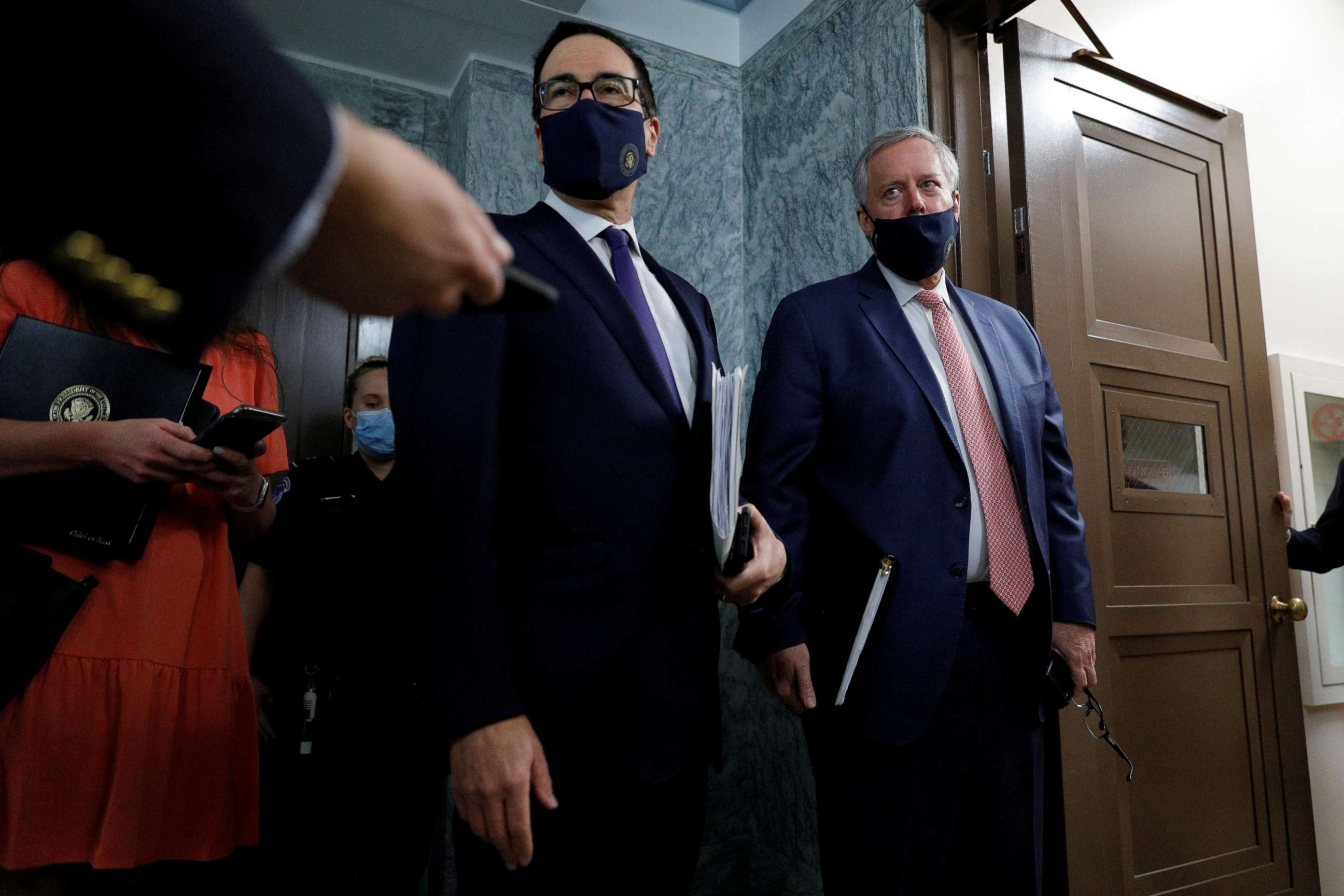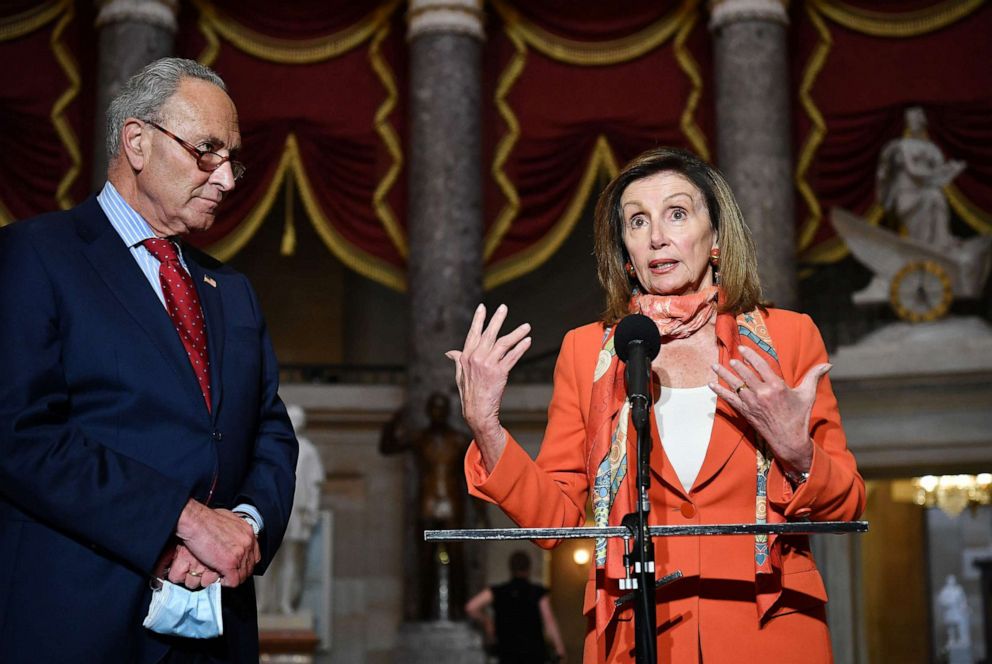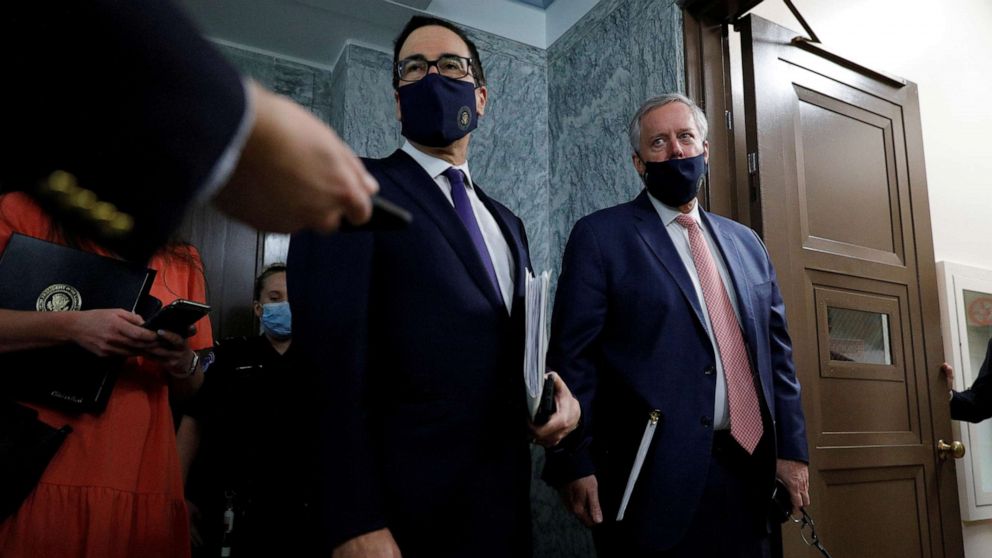White House officials signal coronavirus relief negotiations will cease if an agreement is not reached by Friday
White House officials told Senate Republicans on Wednesday that if a deal is not reached with Democrats on coronavirus relief by Friday, negotiations will likely stop.
"I think at this point we're either going to get serious about negotiating and get an agreement in principle," Chief of Staff Mark Meadows told reporters Wednesday. "I've become extremely doubtful that we'll be able to make a deal if it goes well beyond Friday."
Senate Minority Leader Chuck Schumer snapped back at Meadows' remark, following another day of negotiations between the parties, saying that Democrats would not be the ones to leave negotiations.
"We are not walking away," Schumer said. "We will stay here as long as it takes to get an agreement and we urge Mr. Meadows to sit down and continue to work with us and to do it as long as it takes."

Treasury Secretary Steve Mnuchin tried to walked back the deadline set by Meadows as he departed the Capitol following negotiations on Wednesday adding that he does not "want to describe this an an end of the week deadline," but Meadows held firm.
He said Friday is not necessarily a "drop date" but then added, "my optimism continues to diminish the closer we get to Friday and certainly falls off the cliff exponentially after Friday."
Meadows continued to hold out the possibility of executive actions by President Donald Trump on student loans, unemployment insurance and evictions but declined to say what the timeline for action would be.
"We've got those proposals before him and he'll make decisions on those in the coming days," Meadows said.
At a White House press conference Wednesday, Trump also highlighted some of those possibilities.
"My administration is exploring executive actions to provide protections against eviction," he said. "As well as additional relief to those who are unemployed as a result of the virus. Very importantly, I am also looking at a term-limited suspension of the payroll tax."
He also complained about an effort by Democrats to help state and local governments.
"The Democrats are primarily interested in a $1 trillion bailout of the poorly run states," Trump said. "We have some states and cities -- you know them all -- we don't have to go through names, but they've been very poorly run over the years, and we can't go along with the bailout money. We’re not going to go along with that, especially since it's not COVID related."
Entering negotiations on Wednesday, Schumer was asked about the possibility of a deal being reached by Friday and said that there are still divides between the parties.
"Well, we're working very hard but we got a lot of issues," Schumer said. "We see the problem as bigger, bolder and requiring more action than they do."
Multiple senators leaving the GOP conference policy lunch Wednesday said that Meadows had conveyed that Friday was a firm stopping point.
Sen. Roy Blunt, R-Mo., said that the negotiators relayed a similar message to the full GOP conference during their policy lunch.
"If there is not a deal by Friday, there won't be a deal," Blunt said. "At some point you have to set a deadline or just continue this Kabuki dance every day and nobody wants to."
This follows Tuesday's announcement that the negotiators had agreed to reach an agreement, if one is possible, by Friday.
But that seems to be about where agreement between Meadows, Mnuchin, Schumer and Speaker of the House Nancy Pelosi stops.

Senators who met with administration officials said the negotiations on Wednesday seemed almost identical to days prior.
"I still basically heard the same thing," Sen. Mike Braun, R-Ind., said. "There's a wide gulf between White House negotiators and Democrats."
The Senate is approaching what would be the start of its August recess at the end of the week.
Majority Leader Mitch McConnell said Wednesday that the Senate will delay its recess and remain in session next week, though it is not clear what sort of action would take place during that time if negotiations on a package break down.
As tensions begin to boil over, Republicans are expected to begin offering piecemeal portions of their coronavirus relief proposal, the HEALS act, on the Senate floor.
Up first will likely be an effort to extend the paycheck protection program, whose application window closes at the end of the week.
Republicans have already attempted an extension of the unemployment benefits on the Senate floor -- an effort which was quashed by Democrats.
Democrats have flatly rejected the idea of a piecemeal series of bills. They've argued that a "big," "bold" and "comprehensive" bill is necessary to combat the ongoing health and economic crisis.
The Democratic proposal, which has already passed the House of Representatives, costs nearly $3 trillion. The Republican proposal is around $1 trillion.
ABC News' Libby Cathey contributed to this report.
What to know about the coronavirus:
- How it started and how to protect yourself: Coronavirus explained
- What to do if you have symptoms: Coronavirus symptoms
- Tracking the spread in the U.S. and worldwide: Coronavirus map
Tune into ABC at 1 p.m. ET and ABC News Live at 4 p.m. ET every weekday for special coverage of the novel coronavirus with the full ABC News team, including the latest news, context and analysis.




